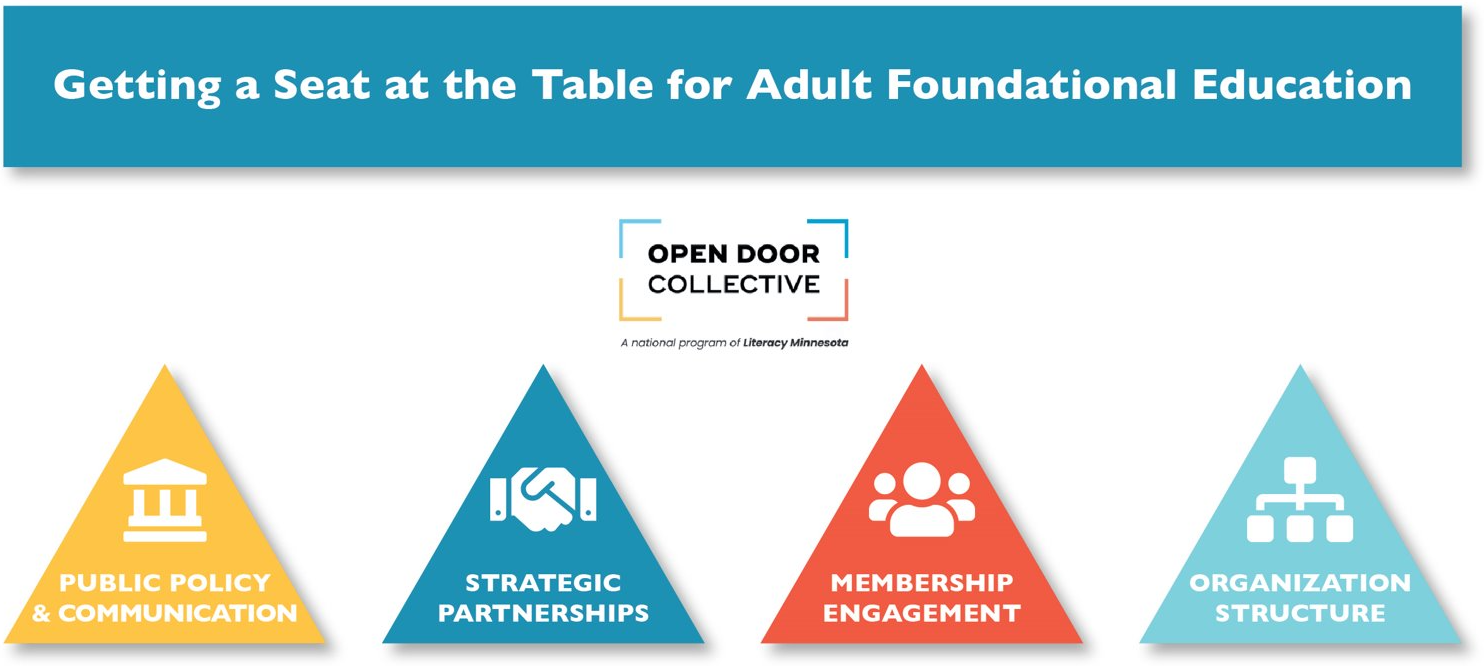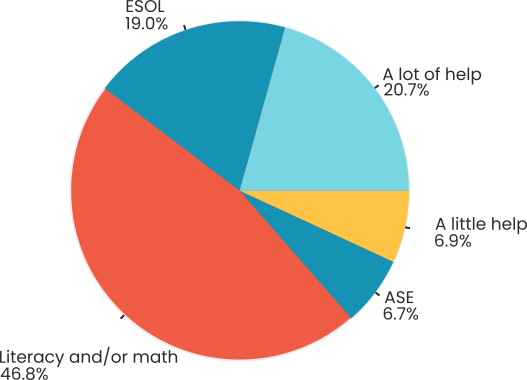Open Door Collective
What's New
latest webinar
Teaching data literacy, advancing communicative justice with immigrant and refugee communities
Data literacy is essential to empowered decision-making in so many arenas of everyday life — healthcare, schools, work, civic life, and more. This session discusses how learners from immigrant/refugee communities can be supported in developing their data literacy skills. Maricel Santos shares strategies from the Communicative Justice Initative to develop resources for data literacy teaching and learning in adult literacy/ESOL programs.
Additional resources:
Advancing Data Literacy for Adult Learners and Democratizing Data
Download resources for webinar: presentation slides, teacher worksheet and framework outline.


mission
ODC's mission is to reduce poverty in the U.S. by building partnerships between adult foundational (basic) skills programs and organizations supporting social and economic justice.
vision
“A future where adult literacy is (adult foundational skills are) an integral part of achieving social and economic justice”
poverty alleviation efforts
The Open Door Collective (ODC) is dedicated to reshaping U.S. society to have dramatically less poverty and economic inequality and more civic engagement and participation in all our society has to offer. As professionals working in adult education, social services and poverty reduction, ODC members believe that adult foundational (basic) skills education and lifelong learning programs can help open the doors of opportunity for everyone to healthier, more prosperous and satisfying lives. ODC members have expertise in connecting adult foundational skills to employment and training, health care, and family and social services. We believe that helping all adults to acquire and use English language, basic literacy, numeracy, high school equivalency, college readiness, and technology skills will improve everyone’s economic outcomes, broaden social participation and move us much closer to the kind of society in which we all want to live.
Our People
Lecester Johnson
Lecester Johnson is the Chief Executive Officer of Academy of Hope, a nonprofit adult public charter school. Academy of Hope empowers over 500 adults in the process of earning a high school credential and building foundational skills. Lecester’s passion for education began at the early age of twelve when she held her first class for her four siblings to prevent learning loss over summer break. Since then, Lecester has further supported education and workforce development, including assisting with the initial re-establishment of the DC Public Schools vocational evaluation program. She holds a master's and an education specialist (Ed.S) degree in transition special education and severe emotional disturbance from The George Washington University. In 2011, Lecester earned the Meyer Exponent Award for excellence in nonprofit management. She can be reached at: lecester@aohdc.org.
Holly McCoy
Holly McCoy is the Executive Director of Literacy Services of Wisconsin. Ms. McCoy holds a Bachelor of Arts in English and Secondary Education and a Master of Arts in Adult Education, both from Alverno College. She has developed several innovative High School Equivalency Diploma programs. One of those programs, a new Construction HSED created in partnership with WRTP/BIG STEP, won a collaboration award at LISC’s annual MANDI Awards event and was recognized as an innovative practice by the U.S. Department of Education. Ms. McCoy has led two mergers and worked with her colleagues to make the agency a top-quartile AEFLA performer. Previous to her current role, she served as the Senior Director of Programs for Literacy Services, overseeing the programmatic operations of eight Milwaukee Area locations serving approximately 1,300 adult students annually. Ms. McCoy serves on several community committees related to adult literacy and workforce development. She can be reached at holly@literacyservices.org
Eric Nesheim
Eric serves as Managing Director - Digital Strategies at Literacy Minnesota.
Eric has served in various program and management roles at Literacy Minnesota since 1990, prior to being named executive director in 2000. In addition, he is currently on the Governor's Workforce Development Council. He was a founding member and past president of the St. Paul Community Literacy Consortium, and serves on its executive committee. He has also served on the Adult Basic Education (ABE) Policy Task Force, on the ABE Teacher Licensure Task Force and as a member of the Governor’s Taskforce on Reading Excellence. Eric is a registered lobbyist and former president of Literacy Minnesota, an advocacy group for adult literacy.
Eric began his human services career by serving in the Peace Corps in Haiti and Paraguay. He earned his B.A. from Concordia College, Moorhead, Minnesota, and a Master’s of International Management from the University of St. Thomas, St. Paul.
He can be reached at enesheim@literacymn.org.
David J. Rosen
David J. Rosen holds a doctorate in education evaluation from the University of Massachusetts Amherst. He was Executive Director of the Adult Literacy Resource Institute at the University of Massachusetts in Boston, from 1986 to 2003. As an independent consultant since 2003, he has recently provided education and evaluation services to, among other organizations: TERC, as an evaluator of the Massachusetts SABES adult basic education mathematics professional development center; Essential Education, to develop an online guide to blended learning for adult educators; and with Strategy Matters, to the City of Boston to assist in planning the Office of Workforce Development’s Career Pathways Initiative. He is the moderator of two U.S. Department of Education-sponsored LINCS communities of practice: Integrating Technology; and Program Management. David was the evaluator of English Now, a pilot nonformal education blended learning model sponsored by World Education’s Education Tech Center and Peer to Peer University, that provided English language instruction to adults on waiting lists for English classes. He is an advisor to the English Now! national scale-up project that began in the fall of 2018. David is a co-founder of the Open Door Collective. He can be reached at djrosen123@gmail.com.
Federico Salas-Isnardi
Federico Salas-Isnardi has worked for over 30 years in the adult education and literacy space and is a leader concerned with the intersection of education and equitable opportunity.
As the inaugural director of the Mayor’s Office for Adult Literacy (MOAL) in Houston, Texas, he works tirelessly to develop visionary initiatives that address the impact of low functional literacy, including digital literacy, in the life of our communities and across generations. He has engaged partners in the community to develop and implement a long-term strategic plan for adult literacy (https://houstontx.gov/adultliteracyblueprint/).
His experience includes working with local, state, national, and international educational projects where his perspective is widely respected.
A linguist by training, Federico has presented hundreds of professional development workshops and is a regularly invited speaker on matters of diversity, equity, and inclusion at conferences around the nation. He is a published author of ESL and citizenship textbooks, holds a master’s degree in Applied Linguistics, and is a Certified Diversity Trainer and a Credentialed Adult Education Administrator in Texas.
He can be reached at Federico.Salas-Isnardi@Houstontx.Gov
Gwenn Weaver
Gwenn Weaver is an independent management consultant, recently retired from working as a broadband program specialist at the U.S. Department of Commerce, National Telecommunications and Information Administration (NTIA). She served as federal program officer for NTIA's Broadband Technology Opportunities Program (BTOP), and staffed the development of the federal Digital Literacy Portal (digitaliteracy.gov). Presently, she is participating in a project for a ProLiteracy, serving on the Committee on Literacy of the American Library Association, and is a national advisor to the Great Stories program of the ALA. Prior to joining NTIA, she was a vice president at a higher education consulting practice, and has worked for other federal government agencies, two large research universities, several consulting firms and a major bank. She began her career in libraries, having been a public, school, academic and special librarian. She holds a Master of Business Administration in information systems, Master of Science in Library Science, Bachelor of Arts in sociology and an Associate of Arts degree. She can be reached at gwwork50@gmail.com
Lecester Johnson | lecester@aohdc.org
Holly McCoy | holly@literacyservices.org
Eric Nesheim | enesheim@literacymn.org
David J. Rosen | djrosen123@gmail.com
Federico Salas-Isnardi | federico.salas-isnardi@houstontx.gov
Gwenn Weaver | gwwork50@gmail.com
Who OUR FIELD serveS
1 in 3 adults would benefit from literacy support

The PIAAC assessment found that one in three (42.1 million) US adults report that they speak or write English not well or not at all, have low literacy or math skills, or do not have a high school credential.
- An Open Door Out of Poverty, 2021

Spring 2023 Newsletter

Spring and Summer 2022

Winter 2020 Newsletter

Fall 2020 Newsletter

Spring 2020 Newsletter

Winter 2019 Newsletter

Fall 2019 Newsletter

Spring 2019 Newsletter

Fall 2018 Newsletter

Spring 2018 Newsletter

Digital Inclusion
Health and AFE

Labor and Workforce Development

Immigrant and Refugee Education and Integration

Public Libraries and Adult Foundational Skills

Affordable Housing

Criminal Justice Reform

Advancing Adult Foundational Education
Recommended Readings and Resources
Open Door Collective Recommended Readings and Resources
The Open Door Collective (ODC) seeks to bridge isolated adult basic skills education and poverty reduction advocacy efforts. By sharing information about the key issues and programs in each area, we hope to facilitate more collaboration and innovation, leading to greater success for these communities.
Open Door Collective’s “Make the case” for adult basic skills initiative. Learn more about it
Poverty Reduction Advocacy Community. For those working in, or advocating for, poverty reduction and increased opportunity efforts, we suggest readings and resources that explain why and how adult basic skills education can help. Readings and Resources about Adult Education for Advocates of Poverty Reduction and Increased Opportunity
Community Health Advocacy Community. For those working in, or advocating for, community health, and reduction of health disparities for low-income and immigrant families, we suggest these readings and resources. Readings and Resources about Adult Basic Skills Education for Community Health Advocates.
Adult Foundational (Basic) Skills Advocacy Community. For adult educators, we recommend resources and readings to help them tailor programs to collaborate with poverty reduction and opportunity initiatives. Readings and Resources for Adult Educators about Poverty Reduction and Increased Opportunity
Downloadable Slides from Presentations about the Open Door Collective at conferences
- COABE 2018 in Phoenix, AZ Safety Net Services, Public Libraries and Adult Basic Education, New Americans - Refugee and Immigrant Education and integration, ABE and Community Health
- COABE 2017 in Orlando, FL Reducing Incarceration and Alleviating Poverty, Why Healthy Communities Need Adult Basic Education
-
Slides on the second ODC ABE and Health Paper, on partnerships. http://literacy.ala.org/wp-content/uploads/2017/01/Public-Libraries-and-ABE-Programs-ODC-paper.pdf
Please provide your comments on these readings and other resources, and suggest additional readings and other resources using the ODC Contact page .
Center for Law and Social Policy (CLASP) analysis of the 2014 Census Bureau Poverty Data
